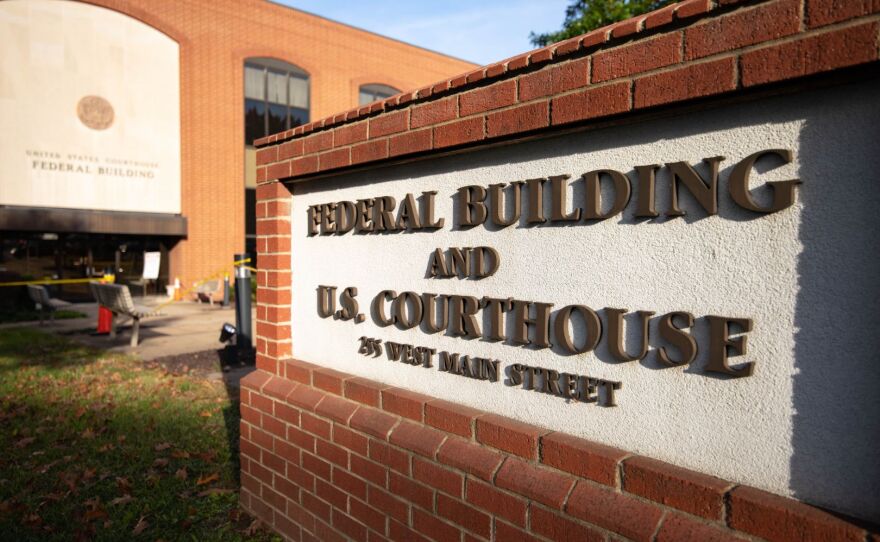Four years ago, hundreds of people - mostly white men - rallied in Charlottesville to protest the planned removal of Confederate monuments and spread white supremacist propaganda. The rally, called Unite the Right, brought a throng of known hate groups from around the country.
Today they are being sued in federal court for another alleged objective: to cause injury and even death.
Over the last month, lawyers for nine current and former Charlottesville residents who were injured during the rally have provided evidence that they say proves the groups and their leaders conspired to commit racially-motivated violence. The suit is backed by the organization Integrity First for America.
Plaintiffs’ council Karen Dunn provided closing arguments Thursday, pointing to how Jason Kessler, a University of Virginia graduate and white supremacist, set in motion the violent events of August 11 and 12.
“As you've heard, Kessler built an army for that battle, complete with organizers, group leaders and promoters who would bring hundreds of followers who were armed and foot soldiers who would carry out the mission,” she said. “They all shared a common unlawful purpose as required by the instructions to cause racially-motivated violence at the 'Battle of Charlottesville’.”
That rally ended in lasting trauma, countless injuries, and the murder of counter-protester Heather Heyer.
James Alex Fields Jr., an Ohio man and self-proclaimed member of neo-Nazi group Vanguard America, was sentenced to life in prison for murdering Heyer, when he drove his car into a crowd on a narrow city street. The Virginia Court of Appeals denied Fields' appeal this week, upholding this conviction.
Plaintiff Marcus Martin, Natalie Romero, Marcus Baker and Chelsea Alvarado were were struck by Field’s car. Marissa Blair, Martin's former fiancée and friend of Heyer, narrowly escaped Field's car when Martin pushed her out of harm's way.
Four other plaintiffs, April Muñiz, Devin Willis, Elizabeth Sines and Rev. Seth Wispelwey, testified to being intimidated and harassed.
Most testified to having lasting trauma, anxiety and flashbacks. Plaintiffs who were struck by the car are asking for $7-10 million in damages. Those injured in other ways are asking for $3-5 million.
Defendant’s counsel James Kolenich referenced the plaintiffs' testimony in his closing arguments.
“When you’re hearing all this from the plaintiffs, I want you to say, ‘So what?’. I want you to pay attention and realize you have jobs to do as jurors. The bravery of the plaintiffs and the horrific injuries that many of them suffered don’t prove a conspiracy,” he said. “They've proven to you that the alt right is the alt right. They're racist. They're anti-Semites. No kidding. You knew that when you walked in here.”
Richard Spencer, a long-time leader of the alt-right who represented himself in the trial, moved to justify white nationalism, calling the trial a “weapon against free speech.”
“White nationalism is about family. It’s about us. Being dedicated to something so that [we] can survive further," Spencer said. "At least for me, that absolutely is a cause I would risk quite a bit for.”
The twelve jurors in the case have heard from 36 witnesses and experts and have reviewed hundreds of documents, videos, depositions and online chats over the last four weeks. They’ll now move forward with deliberations to return verdicts for each of the individual defendants.
Because this is a civil matter, the plaintiffs need not prove their case beyond a reasonable doubt, they only have to show that the defendants, more likely than not, planned to commit violence.
Plaintiff's attorney Karen Dunn reminded the jury of these instructions during closing arguments.
“Some of the defendants in this case, as you know, have pointed out that they didn't participate in the torch march or they weren't on Discord,” she said. “But under the law that Judge Moon has instructed you, that doesn't matter. They're still part of the conspiracy. And their co-conspirators' actions are still attributed to them if they were reasonably foreseeable.”
She likened the case to a drug conspiracy.
“It doesn't matter if you're a big fish or a small fish. It doesn't matter if you're the big fish, and you know what the small fish are doing down the block,” she said. “It doesn't matter if you sold the drugs on a Saturday, or on a Friday or the beginning or the end. Once you join the conspiracy at any time, you're liable for the whole conspiracy.”
Judge Norman K. Moon already found defendants Elliott Kline and Robert Azzmador Ray guilty of conspiring with at least one or more co-conspirators after they refused to participate in the lawsuit.



